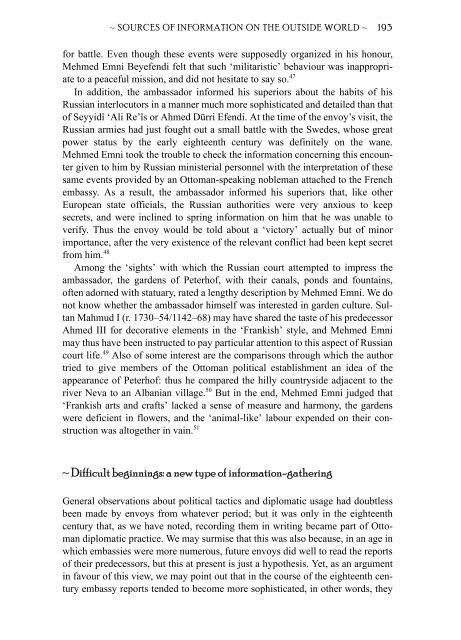The Ottoman Empire and the World Around It - Course Information
The Ottoman Empire and the World Around It - Course Information
The Ottoman Empire and the World Around It - Course Information
You also want an ePaper? Increase the reach of your titles
YUMPU automatically turns print PDFs into web optimized ePapers that Google loves.
~ SOURCES OF INFORMATION ON THE OUTSIDE WORLD ~ 193<br />
for battle. Even though <strong>the</strong>se events were supposedly organized in his honour,<br />
Mehmed Emni Beyefendi felt that such ‘militaristic’ behaviour was inappropriate<br />
to a peaceful mission, <strong>and</strong> did not hesitate to say so. 47<br />
In addition, <strong>the</strong> ambassador informed his superiors about <strong>the</strong> habits of his<br />
Russian interlocutors in a manner much more sophisticated <strong>and</strong> detailed than that<br />
of Seyyidî ‘Ali Re’îs or Ahmed Dürri Efendi. At <strong>the</strong> time of <strong>the</strong> envoy’s visit, <strong>the</strong><br />
Russian armies had just fought out a small battle with <strong>the</strong> Swedes, whose great<br />
power status by <strong>the</strong> early eighteenth century was definitely on <strong>the</strong> wane.<br />
Mehmed Emni took <strong>the</strong> trouble to check <strong>the</strong> information concerning this encounter<br />
given to him by Russian ministerial personnel with <strong>the</strong> interpretation of <strong>the</strong>se<br />
same events provided by an <strong>Ottoman</strong>-speaking nobleman attached to <strong>the</strong> French<br />
embassy. As a result, <strong>the</strong> ambassador informed his superiors that, like o<strong>the</strong>r<br />
European state officials, <strong>the</strong> Russian authorities were very anxious to keep<br />
secrets, <strong>and</strong> were inclined to spring information on him that he was unable to<br />
verify. Thus <strong>the</strong> envoy would be told about a ‘victory’ actually but of minor<br />
importance, after <strong>the</strong> very existence of <strong>the</strong> relevant conflict had been kept secret<br />
from him. 48<br />
Among <strong>the</strong> ‘sights’ with which <strong>the</strong> Russian court attempted to impress <strong>the</strong><br />
ambassador, <strong>the</strong> gardens of Peterhof, with <strong>the</strong>ir canals, ponds <strong>and</strong> fountains,<br />
often adorned with statuary, rated a lengthy description by Mehmed Emni. We do<br />
not know whe<strong>the</strong>r <strong>the</strong> ambassador himself was interested in garden culture. Sultan<br />
Mahmud I (r. 1730–54/1142–68) may have shared <strong>the</strong> taste of his predecessor<br />
Ahmed III for decorative elements in <strong>the</strong> ‘Frankish’ style, <strong>and</strong> Mehmed Emni<br />
may thus have been instructed to pay particular attention to this aspect of Russian<br />
court life. 49 Also of some interest are <strong>the</strong> comparisons through which <strong>the</strong> author<br />
tried to give members of <strong>the</strong> <strong>Ottoman</strong> political establishment an idea of <strong>the</strong><br />
appearance of Peterhof: thus he compared <strong>the</strong> hilly countryside adjacent to <strong>the</strong><br />
river Neva to an Albanian village. 50 But in <strong>the</strong> end, Mehmed Emni judged that<br />
‘Frankish arts <strong>and</strong> crafts’ lacked a sense of measure <strong>and</strong> harmony, <strong>the</strong> gardens<br />
were deficient in flowers, <strong>and</strong> <strong>the</strong> ‘animal-like’ labour expended on <strong>the</strong>ir construction<br />
was altoge<strong>the</strong>r in vain. 51<br />
~ Difficult beginnings: a new type of information-ga<strong>the</strong>ring<br />
General observations about political tactics <strong>and</strong> diplomatic usage had doubtless<br />
been made by envoys from whatever period; but it was only in <strong>the</strong> eighteenth<br />
century that, as we have noted, recording <strong>the</strong>m in writing became part of <strong>Ottoman</strong><br />
diplomatic practice. We may surmise that this was also because, in an age in<br />
which embassies were more numerous, future envoys did well to read <strong>the</strong> reports<br />
of <strong>the</strong>ir predecessors, but this at present is just a hypo<strong>the</strong>sis. Yet, as an argument<br />
in favour of this view, we may point out that in <strong>the</strong> course of <strong>the</strong> eighteenth century<br />
embassy reports tended to become more sophisticated, in o<strong>the</strong>r words, <strong>the</strong>y


